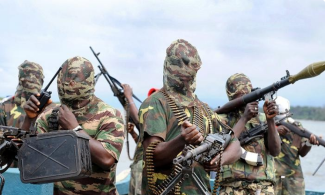
In addition, the Army Chief spoke on the report by the human rights organization, Amnesty International (AI) that alleged war crimes committed by Nigeria’s military. These allegations included reports of 8,000 people murdered, starved, suffocated, and tortured to death. The organization recommended that the new administration work towards ensuring the protection of civilians.

The Nigerian Army Chief of Administration, Adamu Abubakar, in a press briefing on Friday has said that 350 suspected Boko Haram terrorists have been recommended for trial at a Federal Court. The trial would be centered on the terrorist activities they are suspected of in the Northeastern part of Nigeria.
The 350 Boko Haram suspects recommended for trial are only a fraction of the 504 persons currently in detention.
The Army Chief, Abubakar, said that two Joint Investigation Teams have been set up by the defense headquarters to investigate, screen, and categorize suspected insurgents in detention. The files on the suspects were then forwarded to the office of the Attorney General and the Ministry of Justice for further review.
In addition, the Army Chief spoke on the report by the human rights organization, Amnesty International (AI) that alleged war crimes committed by Nigeria’s military. These allegations included reports of 8,000 people murdered, starved, suffocated, and tortured to death. The organization recommended that the new administration work towards ensuring the protection of civilians.
Abubakar stated that the allegations “are a rehash of the same allegations made in 2011.” He said that the only new claim made by Amnesty International was the reported increase of victims of extrajudicial killings from 4,600 to 13,000.
In addition, Mr. Abubakar said, “The military is still conducting investigations on Amnesty International’s allegations.”
Already the preliminary reports have led to the release of some women and children from military holding facilities.